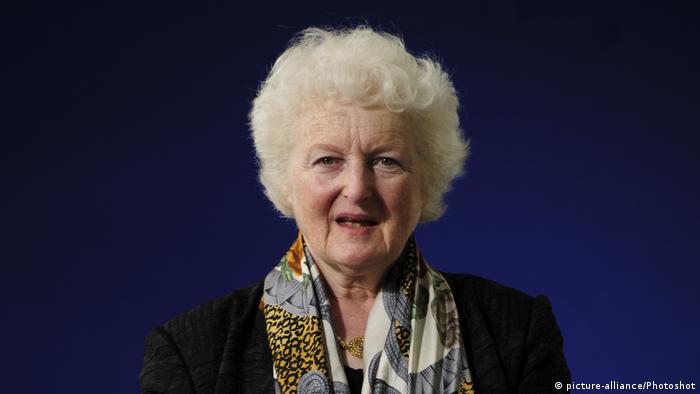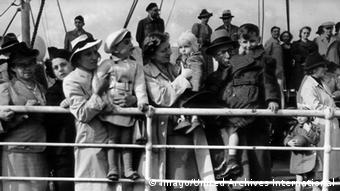Since the Brexit decision in 2016, thousands of British Jews, whose ancestors escaped from Nazi Germany to apply for a German passport. However, many get rejected. But there is also good news.

Baroness Rabbi Julia Neuberger wants. since the Brexit Referendum in 2016 the German citizenship and therefore a European passport With the girl’s name Julia Schwab, the prominent Rabinnerin in 1950, was born in London, as the child of a Jewish mother, Nazi Germany was able to leave and to England fled. Neuberger feels as a European with a German mother, who had to flee from Germany. “But from the German Embassy in London, I always got a rejection,” she says in an interview with Deutsche Welle.
Admiration for Germany
“It doesn’t make me less British, but it allows me a little of my story to recover,” said Neuberger 2016 your concern to have a German passport. And admiration for Germany, “as it is with its national socialist past is dealt with.”

Jewish refugees from Germany arriving in Southampton in 1939
The Rabbi knows of other British Jews, who have experienced the same Situation. They all have ancestors who had to flee Nazi Germany – and now in the light of Britain’s withdrawal from the EU a European passport. But most received only a refusal. “We all think that is unfair and discriminatory,” says Neuberger.
Over 100 Cases
The English daily newspaper “the Guardian” reported on Wednesday that more than 100 British Jews, which strive as the descendants of Jewish refugees from the Nazi Regime since 2016 to have a German passport and so far failed.

Jews in a London synagogue
It is the other side of the Brexit-decision three years ago. Immediately after that, several hundred British Jews applied for German citizenship in order to have, at least as a second passport is a document of the European Union. Even in 2015, aspired only 43 British German citizenship to. In 2017, the number 1667 amounted to almost 40 Times as much. How many rejections there are, in fact, can say at the moment nobody exactly. The Federal office of administration for these proceedings, speaking at the request of denials are “very rare”.
The Basic Law
The hopes of the Jewish British reasons in the German basic law. Article 116-2 is in the core: “Former German citizens, those between the ages of 30. January 1933 and 8. In may 1945, the nationality for political, racial or religious grounds has been extracted, and their descendants shall on application again.”

The connectedness to the Jewish community is every Federal government in Germany.
However, this commitment of the basic law has been concretised by further legal regulations in the course of time and to a limited extent. And according to existing law, applicable to the situation were able to acquire marital children who were born between 1914 and 1963, the German citizenship only from her German father. From 1. January 1975-born legitimate children acquired the German citizenship through the mother or the father. For those who were born as Julia Neuberger – as the child of a refugee Jewish mother before 1963, there remained only the exception rules to avoid statelessness, or transitional periods, but that expired a long time ago. And this was also confirmed by the highest court. The Federal constitutional court ruled to 1974. A few years later, the transition ended deadlines.
“Allow exceptions”

Charlotte Knobloch, President of the Jewish community of Munich
Jewish organisations in the UK and Germany know the Dilemma for a long time. The former President of the Central Council of Jews, Charlotte Knobloch, experienced in your extended family circle even before the Brexit question, a similar case. He was ultimately decided by a court in favour of the Relatives. And the current President, Josef Schuster, admitted at the beginning of the year in a newspaper interview, the law was “unfortunately not so straightforward as for a Single unsatisfactory”. Therefore the only way is “that competent authorities, in individual cases, especially when it comes to reparation claims, its discretion in favour of the Affected use, and allow exceptions to stay”.
Similar to the President of the European rabbinical conference, the chief Rabbi Pinchas Goldschmidt expressed. In the light of the dark Chapter of German history, he would have been in this question “more tact and historical consciousness of the German authorities expected to argue instead of strictly formal legal terms,“ he told Deutsche Welle. In fact, Germany should be happy about the fact that the descendants of during the third Reich, the Jews persecuted the German citizenship to accept – because they trust Germany again. “It would be nice if here a non-bureaucratic solution is found, which is of particular historical and political responsibility of Germany,” says Goldschmidt.
Stefan Ruwwe-Glösenkamp, a spokesman for the Federal interior Ministry declared that it would be examined against this Background, “presently”, which today is still sustainable consequences in nationality law “, or eliminated to mitigate the”. The Considerations of a proper solution not be completed due to the complexity of the problem “fully”.
Good News
Up to this point the story was written. Then a welcome Mail from London came. “Quick update,” writes Julia Neuberger, the Rabbi with love to Germany. “I just got my citizenship today!”. She is 67 years old. And now also German.